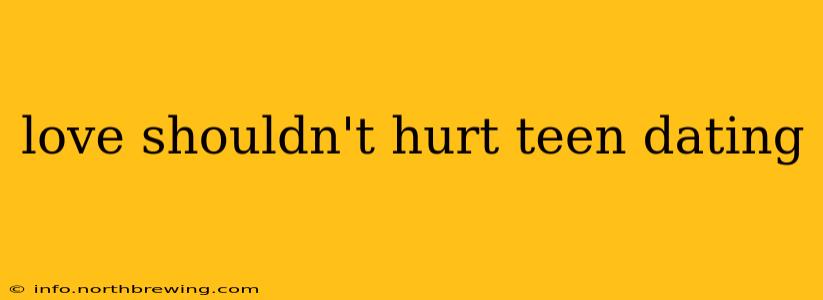Navigating the world of dating as a teenager can be exciting, confusing, and sometimes, scary. It's a time of self-discovery, exploring emotions, and learning about healthy relationships. But it's crucial to remember that love shouldn't hurt. Healthy relationships are built on mutual respect, trust, and open communication, not control, manipulation, or abuse. This guide will help teens understand what constitutes a healthy relationship and how to identify and escape unhealthy ones.
What is a Healthy Relationship?
A healthy relationship is characterized by several key elements:
- Respect: Both partners value each other's opinions, feelings, boundaries, and individuality. They treat each other with kindness and consideration, avoiding insults, name-calling, or belittling.
- Trust: There's honesty and openness between partners. They feel comfortable sharing their thoughts and feelings without fear of judgment or betrayal.
- Communication: Partners communicate effectively and openly, expressing their needs and desires respectfully. They listen actively to each other and work together to resolve conflicts.
- Equality: The relationship is balanced, with both partners sharing responsibilities and having equal say in decision-making. There's no power imbalance where one partner controls or dominates the other.
- Support: Partners support each other's goals and aspirations. They celebrate each other's successes and offer comfort during difficult times.
- Independence: Partners maintain their individual identities and interests outside of the relationship. They have their own friends, hobbies, and personal space.
What are the Signs of an Unhealthy Relationship?
Unfortunately, not all relationships are healthy. Some relationships can be abusive, and it's essential to recognize the warning signs:
- Controlling behavior: One partner tries to control the other's actions, friends, or choices. This might involve checking their phone, dictating who they can see, or limiting their independence.
- Jealousy and possessiveness: Excessive jealousy and possessiveness are signs of insecurity and a lack of trust. A healthy relationship involves trust and mutual respect.
- Emotional abuse: One partner uses emotional manipulation, criticism, or intimidation to control the other. This can include insults, threats, or gaslighting (making someone question their own sanity).
- Physical abuse: Any form of physical violence, hitting, slapping, pushing, or any other form of physical harm is absolutely unacceptable.
- Isolation: One partner tries to isolate the other from friends and family. This is a common tactic used by abusers to gain control.
- Threats and intimidation: Threats of violence, harm, or exposure of secrets are serious red flags.
What if my partner is making me feel bad about myself?
Feeling constantly bad about yourself in a relationship is a massive red flag. A partner should build you up, not tear you down. If your partner constantly criticizes you, belittles your accomplishments, or makes you feel insecure, it's time to re-evaluate the relationship. Healthy relationships foster self-esteem and confidence, not the opposite.
How can I tell the difference between a little argument and abuse?
Arguments are normal in any relationship, but abuse is a pattern of controlling, manipulative, or violent behavior. A single argument doesn't equal abuse, but a consistent pattern of disrespect, control, or violence does. If you're unsure, talk to a trusted adult.
What should I do if I'm in an unhealthy relationship?
Getting out of an unhealthy relationship can be challenging, but it's crucial for your well-being. Here are some steps you can take:
- Talk to a trusted adult: Confide in a parent, teacher, counselor, or other trusted adult. They can provide support and guidance.
- Seek help from a professional: A therapist or counselor can help you process your emotions and develop coping strategies.
- Create a safety plan: Develop a plan for how you will leave the relationship safely and securely.
- Remember you're not alone: Many organizations offer support and resources for teens in unhealthy relationships.
Remember, love should be a source of joy, support, and growth, not pain or fear. If your relationship doesn't feel healthy, it's okay to seek help and end it. Your well-being is paramount. You deserve to be in a relationship where you feel loved, respected, and safe.
